Do you find you get sick more often when you’re exposed to cold air during the winter months?
Getting a cold or the flu in the winter is no joke. In fact, the CDC reports that anywhere from 12,000 – 56,000 people could die from the flu during any given year.
The cold weather can wreak havoc on your immune system and cause you to get sick more easily and more often. While there are several myths related to cold weather and illness, a spike in sickness during the cooler months is, indeed, a reality.
So, why does cold weather make you sick? Read on to find out and learn what you can do to protect yourself.
Does Cold Weather Make You Sick?
All our lives we’ve heard warnings about not going out in the cold lest we catch a cold. You can still hear your parents telling you not to go outside with wet hair and make sure you wear a jacket to prevent illness from creeping in. But is it true?
Can cold weather really make you sick? If it can, then how? It’s not the same as having a sick person cough near you or touching a surface covered in germs. So why should the temperature outside affect how and why we get a cold or flu?
Well, the myth is somewhat true. It’s not the weather itself but some of the other things associated with cold temperatures that lead to more airborne illness during the cooler months. Let’s find out more…
The Causes
While the cool air itself isn’t enough to get you sick on its own, the circumstances surrounding colds and how we catch them do change during the winter months. Many viruses like the Rhinovirus, which causes a cold, are more likely to multiply and spread in cooler weather and when your body temperature is lower than normal.
A recent study found that when the body’s temperature is lowered, the nose becomes less adept at fighting off infection and illness when a virus is breathed in through that passageway. When our body’s cool down, we seem to make more mucus, regardless of whether or not you’re sick.
This means you’ll be coughing and sneezing more often than during the warmer months and with all that mucus moving around, it’s more likely to get attached to a virus which can make you ill. And if you are sick, this excess in mucus is one of the most common ways to spread an illness.
Between viruses surviving and thriving in cooler temperatures and your body’s defense being weakened once the degrees drop, we have a perfect storm for catching that winter cold or flu.
Indoor Heating Is a Problem
One of the biggest problems during the winter is how we go back and forth between extreme outdoor temperatures and often too-warm indoor temperatures created by a heater. Not only is the warm air blowing, whether it’s from central heat or a space heater, but the heat itself is dry.
If you live someplace really cold, this could go on for four or five months out of the year. The heat will is always running and drying out your sinuses. Not to mention you won’t be letting fresh air in on a regular basis.
As the dry air blows, you don’t have much ventilation. So you’re breathing in whatever is coming out of those vents, which can cause allergies, sneezing, dryness and more. These symptoms make it more likely for cold and flu viruses to spread, especially because they’ll be trapped indoors and recirculated since they have nowhere to go.
Scientists have found that people who live in spaces with poor ventilation and low humidity during the cooler months are more likely to get and stay sick. Humitidy works to stop the viruses from spreading and weakens its strength. So living in a place with more moisture in the air can’t hurt.
Prevention
Because colds and the flu spike during the winter months, it’s important to be extra diligent about prevention. This, of course, means some of the basics like washing your hands more than usual and sneezing into the inside of your elbow. But there are more steps you can take to be cautious about catching something this winter.
Don’t touch things! We know we can’t actually do this, but touching things is one of the easiest ways to get sick. If you touch a doorknob that a sick person touched, then you have an itch on your nose or you rub your eye and poof–you’re in bed with a fever.
So, whenever possible, use the back of your hand, your fist or your forearm instead of the palm of your hand as you go about your day. This goes for public transportation, office and apartment doors.
Even the keypad on the credit card machine at your local coffee spot. Use your knuckle to punch in the number instead of the pad on your finger.
Be sure to stay hydrated and load up on Vitamin C if your doctor approves of you taking it. There are ways you can strengthen your immune system before cold and flu season hit.
Consider carrying hand sanitizing wipes so you can wipe down potential germ-infested surfaces. You can also keep your hands clean without having to run to the bathroom. Be sure to wipe down your phone at the end of the day with an antibacterial cloth because those screens are a germ trap!
Head South
With the information above, you no longer have to ask yourself “does cold weather make you sick”? You know the answer and can act accordingly.
Of course, the number one way to avoid this issue is to reside in a warmer location. Cold weather is tough enough to handle even when you’re healthy, why bother trying to deal with it when you’re sick?
Check out the Emerald Coast Urgent Care website to learn how to tell the difference between a cold and the flu, and when it’s right to visit urgent care. And of course, don’t hesitate to contact us with any questions.




